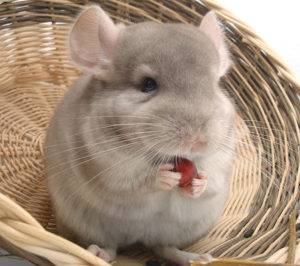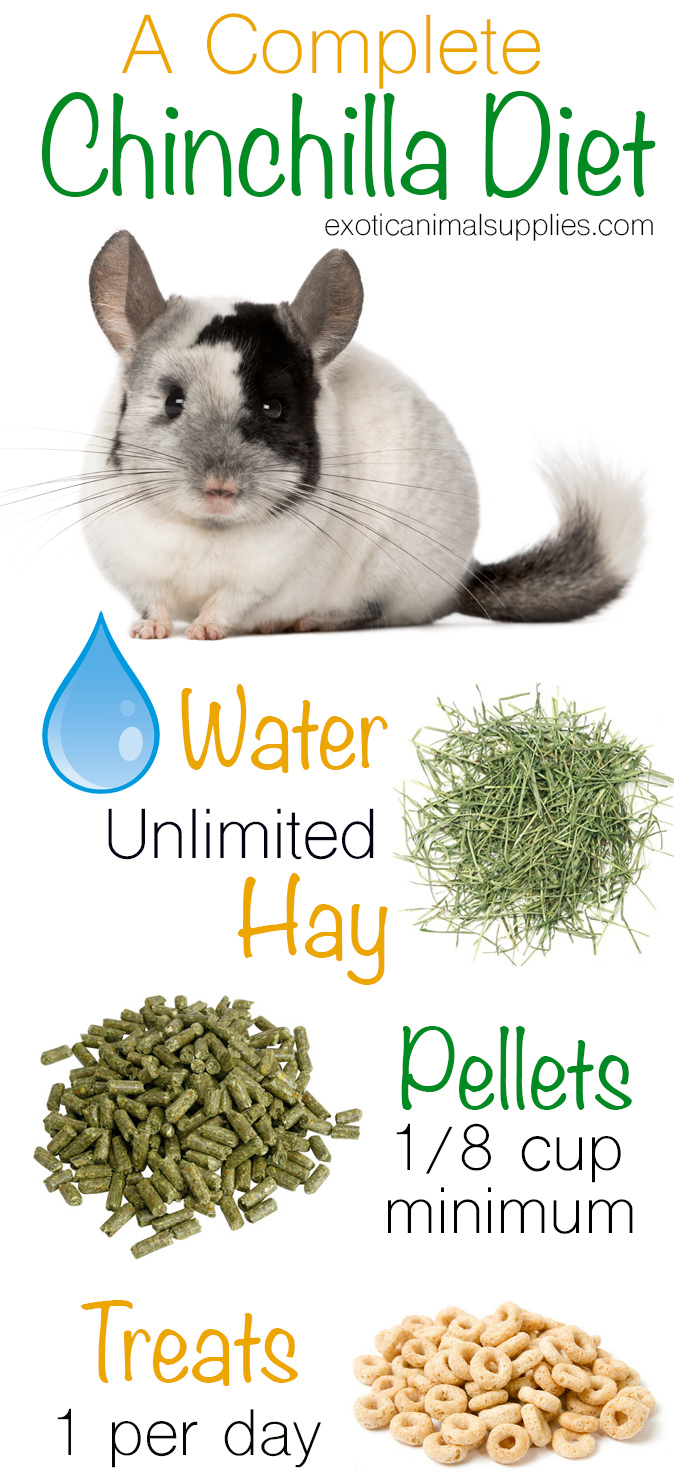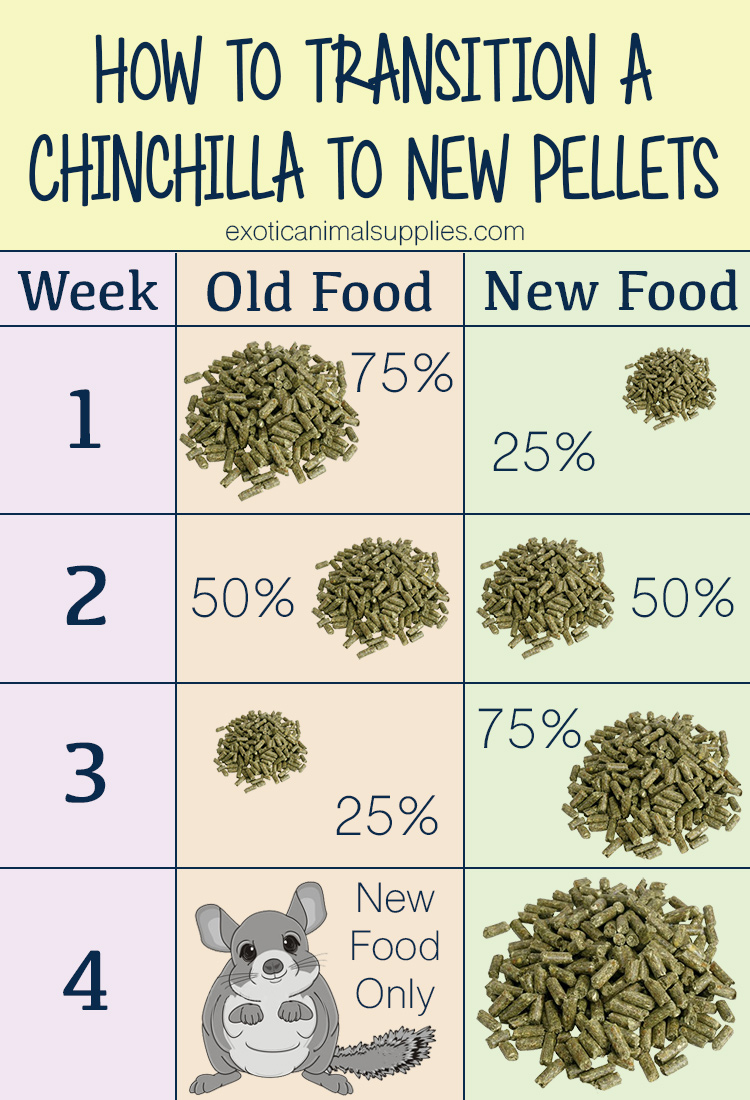 Providing a healthy and balanced diet for your pet chinchilla is one of the most important parts of chinchilla care. This is done by provided good chinchilla food full of the nutrients they need. Maintaining a proper diet will ensure your chinchilla is healthy, happy, and the correct weight. It will also help them live longer and reduce vet bills. Since their diet is so basic and they eat such a small amount, it’s actually very affordable to feed a premium, healthy diet.
Providing a healthy and balanced diet for your pet chinchilla is one of the most important parts of chinchilla care. This is done by provided good chinchilla food full of the nutrients they need. Maintaining a proper diet will ensure your chinchilla is healthy, happy, and the correct weight. It will also help them live longer and reduce vet bills. Since their diet is so basic and they eat such a small amount, it’s actually very affordable to feed a premium, healthy diet.
In this article, we will break down all the important components of a chinchilla’s diet. We will also tell you what to look for when selecting hay and pellets, what to avoid, and recommend brands of food for your pet chinchilla.
Contents
What do chinchillas eat?
A chinchilla’s diet is broken up into four main parts: fresh water, hay, pellets, and treats. Water, hay, and pellets should always be available for your chinchilla. Filtered water should be provided in a chew proof water bottle and changed daily.
Hay is the main part of their diet and should be fed to them constantly through a hay rack or holder in their cage. Generally, timothy hay is the most recommended hay to feed your chinchilla. You can also mix in other types of hay to add a variety of flavors and nutrients, including alfalfa, alpine, orchard grasses, and blue grasses. In addition to nutrients, hay also helps chinchillas grind down their molars, which are ever growing. Hay is often sold in large quantities and should be stored in a dry place with plenty of airflow to keep them from getting damp and moldy.
An alfalfa based pellet should always be available. A single chinchilla will only eat about 1 to 2 tablespoons in a day, but more should always be given. Chinchillas do not overeat pellets so you should serve them more than the minimum amount they need so they always have access to food. The pellets can be served in a food dish or crock. Note: any pellet brand you buy should be PELLETS ONLY. Do not buy pellets that have mixes of seeds, nuts, dried fruit, colored pellets, etc. Your chinchilla will pick the “treats” out of this mix and leave the pellets behind. This can lead to health problems, weight gain, and an imbalanced diet. Never feed pellets formulated for another type of animal.
Treats can be provided as a very small part of your chinchilla’s diet. They are useful for training and helping you bond with your new pet. Make sure you are giving treats only once a day (or less) and that you are giving healthy treats. Read more about healthy treats for chinchillas.
Here’s a handy image to help you remember your chinchilla’s diet. Save to Pinterest to easily find it later.

Can chinchillas eat rabbit food?
Sometimes it can be tricky to find chinchilla food in pet stores or at general grocery stores. Or you may notice that rabbit food is cheaper than chinchilla food. It is not recommended to feed your pet chinchilla any food made for rabbits. Even though they are both small pets, they have very different needs in their diets. The only rabbit foods that are safe to feed chinchillas are rabbit “show” foods. These are feeds designed for show rabbits and are not available in regular pet stores like Petsmart. Examples of this include Purina Rabbit Show Natural Advantage Formula and Manna Pro Premium. If you live near a feed store, you might be able to purchase feeds like that at a cheaper price. Otherwise, you’re better off buying the chinchilla pellets we recommend below, which are available at most pet store chains or online.
Changing Your Chinchilla’s Diet
What if you need to change your chinchilla’s diet? Chinchillas are very sensitive to diet changes and it can lead to health issues, especially digestive problems. Any changes (like switching to a new brand of pellets or trying a new type of treats or hay) must be done slowly. Sometimes your chinchilla will respond poorly to a new food and it should be eliminated completely. Otherwise, you can slowly transition the new food into their diet and slowly remove the old food.
For pellets, you should slowly mix in the new brand of pellets over the course of three weeks. Follow this schedule:
- Week 1: Feed 75% of the old pellets and 25% of the new pellets each day.
- Week 2: Feed 50% of the old and 50% of the new pellets each day.
- Week 3: Feed 25% of the old and 75% of the new pellets each day.
- Week 4: If your chinchilla has no problems, feed the new pellets exclusively.
Use this infographic as a handy reference:

If you notice any change in your chinchilla’s stool, including softness, immediately revert to the previous week’s balance. Sprinkle some acidophilus powder on their pellets to balance their stomach. Once their poops return to normal, you can proceed to the next week.
Chinchilla Food Recomendations
Chinchilla Hay
When buying hay, depending on the supplier, you may have a choice of “cut” either first, second, or third cutting. These stand for which crop of hay it came from during the growing season. Generally, the second cut is the best as it has a good balance of nutrients and fiber.
Kaytee Hay
Kaytee is one of the most common brands of hay and food available, often seen in national pet store chains. They’re also usually the cheapest. Many exotic pet owners complain about the freshness or getting a bad batch, but we have used it without issue. (When buying any hay you should check the freshness and quality of it before feeding it to your pet.)
Kaytee offers the following hay options that are appropriate for chinchillas:
- Timothy Hay (Check Price at Petco | Check price on Amazon)
- Alfalfa Hay (Check price on Amazon)
- Orchard Grass (Check Price at Petco | Check price on Amazon)
Small Pet Select
Small Pet Select is a newer hay distributor on the small animal scene, but they’re getting great reviews from exotic pet owners and are a good brand to consider for your chinchilla’s diet.
One thing that makes them stand out from other chinchilla hay suppliers, is they pack and ship their hay in a cardboard box, which is the best long-term storage option for keeping hay. They offer timothy hay in 1st, 2nd, and 3rd cuttings–we recommend buying the 2nd cutting.
Here are their chinchilla hay options:
- 2nd Cutting Timothy Hay (Check Price at Small Pet Select | Check price on Amazon)
- 3rd Cutting Timothy Hay (Check Price at Small Pet Select)
- Orchard Grass (Check Price at Small Pet Select | Check price on Amazon)
- Alfalfa Hay (Check Price at Small Pet Select)
Oxbow Chinchilla Hay
Oxbow is a brand loved by many chinchilla owners. They offer a variety of hays that are good for chinchillas and can be found in some local and national pet stores. Their hay is grown in the USA and hand selected to ensure good quality products.
The options they offer for chinchillas include:
- Timothy Hay (Check Price at Petco | Check price on Amazon)
- Orchard Grass (Check price on Amazon)
- Alfalfa Hay (Check Price at Petco | Check price on Amazon)
Chinchilla Pellets
Often referred to as chinchilla feed, pellets are important to your chinchilla’s diet, especially since the wrong one can have devastating health effects. The best chinchilla food is whichever you can get reliably and freshly that meets your pet’s needs. Remember to look for an alfalfa-based pellet with no add-ins (no seeds, colored pellets, etc.). Here are our recommended brands to consider.
Oxbow Essentials Chinchilla Food
Another great chinchilla food option from Oxbow. Made from their own hand-selected alfalfa hay, their pellets are nutritionally complete for your chinchilla’s needs. It’s also relatively easy to buy in local pet stores or online so you never have to worry about buying the next bag.
Oxbow chinchilla feed is widely recommended by exotic veterinarians and chinchilla breeders. It’s good for all ages of chins.
Depending on how many little mouths you need to feed, it’s generally available in 3 lb., 5 lb., 10 lb., and even 25 lb. bags.
Mazuri Chinchilla Food
Mazuri is another brand trusted by breeders and veterinarians to provide the nutrition your pet chinchilla needs. They are a little bit harder to find in pet stores, though some national chains carry it. Their pellets are nutritionally complete, using multiple fiber sources including alfalfa, timothy hay, and oats.
If you can find a reliable source to buy Mazuri or don’t mind ordering it online, it’s a fantastic choice of pellets for your chinchilla.
Chinchilla Pellet Food in the United Kingdom
If you’re a chinchilla owner based in the UK, finding the above recommended brands is very tricky. Instead, you should try Beaphar Care+, which is the nutritionally best chinchilla food in the UK.
Another brand to consider is Charnwood Chinchilla Pellets, which is a decent chinchilla food and more affordable than Beaphar Care+.
Don’t forget to check out these healthy treats for chinchillas to round out your pet’s diet.
Check out these chinchilla food dishes and hay racks.






